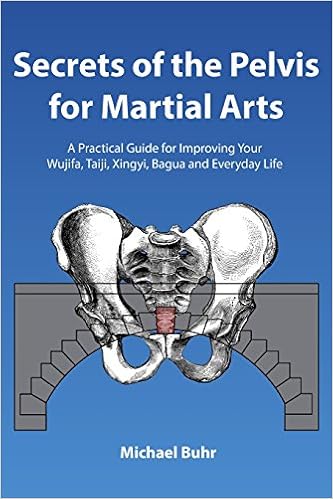* There's a difference between the intention of sitting down and tucking under. Seems that the amount of tuck is dependent upon the angle or direction of the sitting intent.
(Look at how mechanistic I was; geometric right angles? Notice that there aren't any words about the feeling of intent. This was all concept stuff. Pretty convincing though, eh? How interesting... )
* If you don't get the proper posture in standing, then you won't be able to do silk-reeling properly and if you can't do silk-reeling properly, then your tai-chi will be ineffectual.
* The "kua" closed is the inguinal crease. Feet parallel, little more than shoulder width apart, shift side to side. Feel the skin bunch up on the weighted side. This is the kua closed. The other side is kua open. This exercise requires someone getting you properly aligned, set up. If the knees, back, hips, are not aligned properly, then you won't feel the skin bunch up.
* Must see and feel. This is a feeling art. The oral transmission has more to do with the transmission of feeling.
(For the longest time, I thought that the teacher could teach me the feeling. What I've come to learn is that s/he can help me discover the feeling for myself and guide my course.)
* Open your heart and accept people as they are. Then you'll see everyone is really walking around naked, wearing their emotional history in their physical body. Nothing is hidden. There are no secrets.
(I really didn't understand this then but the more I feel and let go in my body, the more I see variations in others' bodies. A pretty amazing by-product.)
* "Concentrate the yi (mind)." Concentrate means like a magnifying glass concentrates or intensifies sunlight. Paying attention is a pre-requisite. "Raise the shen (spirit)." Raise the spirit means being confident, enthusiastic, lively, not depressed. Think, cheerleaders. "Sink the chi." Sink the chi means to relax, to let your legs carry your weight.
(When I first heard this whole concentrate, raise and sink thing, I went completely mystical with it; imagine.... Even years after hearing this pragmatic interpretation, I still don't have a feeling sense of the concentrate part. Maybe these don't develop simultaneously... )
* It has been observed that I'm eager and ready to learn but if what I learn doesn't yield the perceived result in my time frame, then I get angry and emotionally attack the person who taught or shared with me.
(Geez, I can be a real jerk sometimes, eh? I really didn't have a clue as to what this work involved and how I, my body, responded... )
* I had the experience while standing this past week of seeing a black, round hole open in my chest extending tube-like, deep into my body. And in the hole was a crying, pained face. I saw this as looking at myself not from inside my body nor from outside my body, rather, just seeing myself.
(Some say, "Zhan Zhuang is a powerful qigong." Others say, "Don't try this at home." I've learned to say, "That's interesting." This is where I found a teacher/guide to be important in helping to sort out what is relevant to the practice.... )
* Tai chi is more about awakening, recruiting, utilizing the power of the mind to allow or enable the body to perform a certain way.
(This whole "mind" thing can be so confusing and misleading. It seems there's no use of defining it. Just practice and "it" will work as needed. Geez, does that sound Taoist or what?! )
* Consider a stream flowing from a pond. Water flows around rocks, logs, hard earth. From the perspective of the source, the blockages are clear. Looking upstream, the rocks, logs, hard earth are not seen as blockages and the twisting, curving flow of energy is seen and felt as normal and removing the blockages is felt as painful.
* Perfectionism is a disease born of judgment beyond accepting oneself. Accept who you are. Acceptance is not a logical, rational idea. It's a feeling. With acceptance comes a measure of peace.
(Ah.... Here's an aphorism begging for a feeling... I wonder.... What is the feeling of self-acceptance? )
* During one exercise, I noticed that the energy moved freely when recalling 'good' memories but the body closed down and controlled that free flow when recalling 'bad' memories. Alternating between freedom and control several times demonstrated to me that freedom and control are points on a continuum. I am not two different people, one free, one controlled.
(Again, another one of those, "that's interesting" experiences in the process of exploring my mind-body connection.... )
Further reading:
Introductory article explaining this "Journal Notes" series: Zhan Zhuang Training Journal
Previous article in this series: Simple Lessons: Journal Notes #4
Next article in this series: Some GroundPath Stuff: Journal Notes #6


Mike, I really like the pictures you've added in! Thanks so much for sharing yourself through these old journal entries.
ReplyDeleteI agree the pictures of your old note really adds something nice. Wujifa is a wonderful art.
ReplyDelete